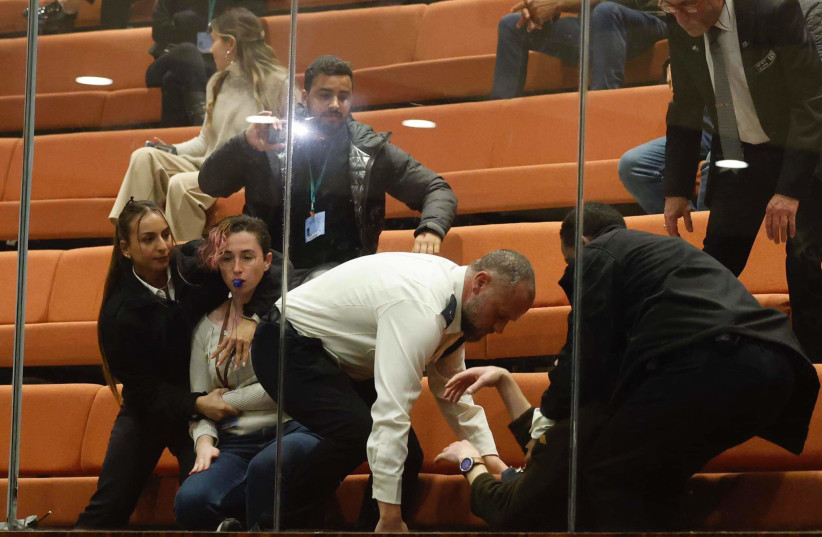The Knesset passed the first reading of the first bill of the government’s proposed judicial reform by a vote of 63-47 late on Monday night.
If it passes the second and third readings, the controversial bill will alter the makeup of the Judicial Appointments Committee so that the coalition has an automatic majority. It will also bar the High Court of Justice from ruling on appeals against Basic Laws.
"Members of the coalition - history will judge you for this night. For the damage to democracy, for the damage to the economy, for the damage to security, it is certain that you are tearing apart the people of Israel and you simply don't care."
Yair Lapid
Opposition leader Yair Lapid reacted to the controversial decision on Twitter. "Members of the coalition - history will judge you for this night. For the damage to democracy, for the damage to the economy, for the damage to security, it is certain that you are tearing apart the people of Israel and you simply don't care."
חברי הקואליציה - ההיסטוריה תשפוט אתכם על הלילה הזה. על הפגיעה בדמוקרטיה, על הפגיעה בכלכלה, על הפגיעה בבטחון, על זה שאתם קורעים לגזרים את עם ישראל ופשוט לא אכפת לכם.
— יאיר לפיד - Yair Lapid (@yairlapid) February 20, 2023
The fierce Knesset plenum session began at 4 p.m. on Monday and continued late into the night, concluding at roughly 12:30 a.m. on Tuesday morning.
Knesset Constitution, Law and Justice Committee chairman MK Simcha Rothman presented the bill.

"The High Court of Justice damaged the status of the judicial system, and this is what is at the heart of the amendments that are being voted on today. The High Court damaged the process of judicial appointments and intervened in legislative processes. The High Court critically damaged the three branches [of government], and thus harmed you, the sovereign. This is what we are coming to fix today."
MK Simcha Rothman
“The High Court of Justice damaged the status of the judicial system, and this is what is at the heart of the amendments that are being voted on today. The High Court damaged the process of judicial appointments and intervened in legislative processes.
“The High Court critically damaged the three branches [of government], and thus harmed you, the sovereign. This is what we are coming to fix today,” Rothman said.
The session included a number of unusual occurrences.
What chaos happened in the Knesset?
Knesset ushers checked the bags of a number of opposition MKs before they entered the plenum out of concern that they would attempt to use megaphones and other instruments to disrupt the procedure.
Yesh Atid MKs draped Israeli flags around themselves as Rothman began his presentation of the law.
Knesset Speaker Amir Ohana ordered the ushers to remove the MKs, saying they were “disrespecting the flag.” They were allowed to return soon after.
Security guards forcibly removed protesters from the plenum observation gallery after they entered it illegally and beat against the glass walls separating them from the plenary area.

Dozens of opposition MKs spoke during the session ahead of the vote, while some Knesset members shouted during the voting proceedings and were removed by Ohana temporarily before being allowed back into the Knesset to vote.
Lapid accused the coalition of not caring about the reform’s consequences on the country’s economy, security and social cohesion.
“Do you even care that you are tearing apart the nation? That you are splitting it, that you are creating a situation in which people hate each other because of their political opinions.”
“Do you even care that you are tearing apart the nation? That you are splitting it, that you are creating a situation in which people hate each other because of their political opinions.”
Yair Lapid
Yesh Atid MK Ram Ben-Barak said that “the Nazi party also started out as a democracy and ended up as a dictatorship,” which drew condemnation.
Prime Minister Benjamin Netanyahu wrote on Twitter, “The opposition has gone off its rocker. Ram Ben-Barak disgracefully and scandalously compares the Israeli government to Nazis. Protest leaders tried to jail coalition members in their homes. Opposition members disgraced the Israeli flag in the Knesset plenum. The opposition has gone off its rocker – and we continue!”
“The opposition has gone off its rocker. Ram Ben-Barak disgracefully and scandalously compares the Israeli government to Nazis. Protest leaders tried to jail coalition members in their homes. Opposition members disgraced the Israeli flag in the Knesset plenum. The opposition has gone off its rocker – and we continue!”
Benjamin Netanyahu
Ben-Barak responded on Twitter: “Netanyahu, Ben-Gvir and all other sycophants who are riding the wave – look at Wikipedia and see how the Nazi party rose to power supposedly democratically and immediately became a dictatorship. The processes that you are initiating will lead us to a dictatorship as happened in Poland, Turkey and Hungary – we are next.”
Ohana announced at the beginning of the session that despite ongoing criminal proceedings against both Netanyahu and Likud MK David Bitan, they would be allowed to participate in the vote.
Yisrael Beytenu announced earlier on Monday that it was planning on boycotting the vote on the Knesset floor so as not to give it a semblance of legitimacy.
What happens to the bill now?
Monday’s vote was significant, as it marked the coalition’s official rejection of President Isaac Herzog’s plan announced last week, which included a freezing of legislation before the first provisions pass their first reading on the Knesset floor.
The vote was also a significant step forward in the legislative process, as what remains will only be the preparation of the bill for its second and third reading, and then to conduct votes on both these readings in one sitting in the Knesset plenum.
It is not clear that the coalition and opposition will be willing to hold a dialogue about the reforms now that the first reading is about to be completed.
